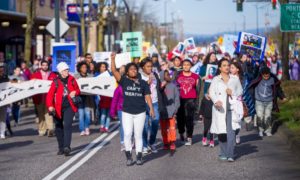By Nancy Lewis
More than 500 leaders and activists plan to gather in New York this month to launch what they hope becomes a massive national service program that would have 100 million Americans actively engaged in community volunteering by 2020. But that would be only the start.
The group, which calls itself ServiceNation and includes some of the top service-learning providers in the country, envisions 1 million people participating each year in some type of full- or part-time national service paid by stipends.
The ServiceNation program is designed in large part to engage teens and young adults who have dropped out of school, are in danger of dropping out or have no plans after high school.
ServiceNation’s policy agenda lays out a broad, and undoubtedly expensive, plan for national service that would include:
* An expanded AmeriCorps: growing from its 75,000 budgeted slots today to 100,000 strong by 2012 and to 250,000 by 2020.
* An Education Corps, to place highly motivated teachers in at-risk schools and community colleges: 45,000 workers by 2012, and 220,000 by 2020.
* A Green/Clean Energy Corps, not unlike the Franklin Roosevelt-era Civilian Conservation Corps, to improve and develop national and local parks: 45,000 participants in 2012 and 220,000 by 2020.
* An Opportunity Corps, to provide nutrition assistance, child care support and job training to urban and rural poor: employing 25,000 by 2012 and 115,000 by 2020.
*A Health Corps, built on the existing Medical Reserve Corps, to help local care providers push prevention education: 5,000 workers by 2012 and 40,000 by 2020.
*A Disaster Relief Corps, ready to be mobilized in national or international disasters: 5,000 signed up by 2012 and 20,000 by 2020.
* Serve America Fellowships, to allow individuals to volunteer at faith-based, community-based or nonprofit organizations: 25,000 fellows in 2012 and 135,000 in 2020.
* International programs, including an expanded Peace Corps, an expanded Volunteers for Prosperity, and Global Service Fellowships (under which volunteers would serve abroad with nongovernmental organizations and faith-based groups).
* Special programs for older and retired workers to serve as English language instructors and to assist in national parks, among other possibilities.
No price tags are attached to any of the projects. While they are reminiscent of the New Deal programs during the Depression, the scope isn’t quite so large. At the height of the Works Progress Administration, in the five years leading up to World War II, more than 3 million people were employed there. The WPA swallowed up more money and energy than any other agency at the time.
Big Names
The broad sweep of the plan is to be unveiled at a Sept. 11-12 summit, which is headed by seven co-chairpersons, including Caroline Kennedy, Alma Powell, Carnegie Foundation President Vartan Gregorian, AARP CEO Bill Novelli and Usher, the recording artist who, at 29, is the youth chairman.
Presidential candidates Sen. John McCain (R) and Sen. Barack Obama (D) will appear separately at the Sept. 11 summit to present their views and answer questions about the role of service in America’s future.
As a candidate, McCain has not pushed service as a top priority. The senator originally opposed President Clinton’s establishment of AmeriCorps, but has since become one of its staunchest supporters. He has praised the efforts of City Year and the National Civilian Community Corps, calling for more programs like them, and he backed an expansion of the college Reserve Officers’ Training Corps, which under the ServiceNation agenda, would gain a civilian counterpart.
On the other hand, Obama’s campaign proposals include a section on service similar to some of what is being put forward by the ServiceNation group. He says his service plan will cost $3.5 billion. Obama was an early board member of Public Allies and his wife Michelle Obama headed the group’s Chicago office when it first opened.
Members of the Leadership Council for the summit include several Obama backers and advisers, including former Sens. Sam Nunn (D-Ga.) and Tom Daschle (D-S.D.), Maryland Gov. Martin O’Malley (D) and Susan Rice, foreign policy adviser of Obama for America.
The Leadership Council, however, is decidedly bipartisan; it includes the president’s brother, Neil Bush, New York Mayor Michael Bloomberg (an independent), David Gergen, adviser to Republican and Democratic presidents, and former Arkansas Gov. Mike Huckabee (R).
The summit, nearly a year in the making, has been shepherded by a small coordinating group consisting of Alan Khazei, co-founder and former CEO of Boston-based City Year and current head of Be the Change, which is the sponsor of the summit; John Bridgeland, head of Washington-based Civic Enterprises; AnnMaura Connolly, senior vice president of City Year; Michael Brown, president and co-founder of City Year; and Michelle Nunn, daughter of former senator Nunn and CEO of the Atlanta-based Points of Light Institute.
The public kick-off for the service campaign will come Sept. 27, on what is being called a Day of Action, to illustrate how increased public service and volunteerism could affect the country.
Contact: (617) 252-2420, www.bethechangeinc.org.































